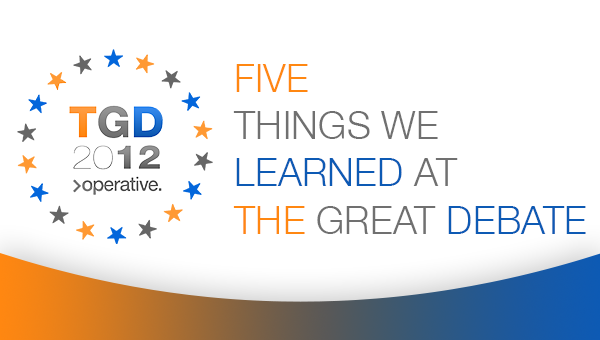
On Thursday, November 15th at New York City’s Core Club, over 100 digital media folks gathered to watch a series of debates between some of the industry’s most provocative thought leaders. The Great Debate, as the event was called, took on some of the thorniest issues that the industry is dealing with today. The topics—measurement, convergence and programmatic buying—were debated by representatives of all sides: agency, publisher, and technology provider.
The Op-Ed grabbed a seat, furiously taking notes in between Instagramming and tweeting. Here, we present five takeaways from the evening. But before we start, please note that those named below were asked to take sides and are not necessarily representing the companies that they work for. Please keep that in mind as you read on.
The Click Really Is Garbage
In the measurement debate, an argument broke out over the actual value of the click. After things were hashed out a bit, it became clear that the click is actually not worth much at all. One debater, drawing on data from a previous comScore study, said that ninety percent of people actually don’t ever click on display ads, and the ten percent that do make up a pretty undesirable segment to advertisers. “The demographic was something called the sweepstakes segment or the trailer park segment,” said another. “Let’s just agree that the click sucks,” said moderator Jim Spanfeller, CEO of the Spanfeller Media Group. “It’s a stupid metric, and we never should have went there, but we did, and now we’re having a hard time getting away from it.”
TV Is a Highly Effective Ad Medium, But May Be in Trouble in 2022
The convergence debate quickly broke into a discussion about the state of television today. The debaters agreed TV is doing pretty well for three reasons: 1) it works 2) it works 3) it works. The reason given by one debater was that it allows advertisers to reach millions of people, with no competing ads, in a single moment. At the end of the debate though, an audience member, Julian Zilberbrand, SVP Global Digital Director, Technology Activation Group Services at Starcom Mediavest Group, asked what the impact would be if the NFL, a major source of ratings, decided to go straight-to-consumer and bypassed the networks. The discussion that followed made it clear that such a move would have highly negative effects on the TV industry, perhaps even breaking its business model. The good news for the television industry is that it seems to have accounted for this by signing massive multi-year contracts with not just the NFL, but with a number of other sports leagues as well. The bad news is that in 2022 the NFL’s contract will expire. If the league tries to pull a Louis CK and bypasses the networks, get ready for a different media world to potentially take root.
Ad Tech Needs To Listen Better
In the debate about programmatic buying, Jason Kelly, CEO of Sociomantic, made an interesting declaration. “I think the ad tech industry owes an apology to advertisers, agencies and publishers,” he said. “Just because a couple of founders can write a deck, put a couple of pieces of paper together, talk a VC into having the most amazing idea…doesn’t mean that’s a good idea. If you were to add one more filter on, where a VC had to go to a publisher and say, ‘hey, we’re going to put $10 million dollars into this idea, do you guys think this a good idea?’ and they said “no you cannot fund that idea,” you would have a hell of a lot less companies. We don’t listen to what people are looking for, and that’s a big gap that we have and it’s been here for years and years.” Heads nodded around the room.
Get Ready For a Period of Consolidation, and Company Failures
Perhaps because there has not been enough listening, the folks on stage predicted that consolidation will start accelerating as soon as next year. Mike Leo, CEO and President of Operative, asked what it would take to overcome those middlemen who were not in it for the good of the industry, but rather to make quick money. “What do we need to do to police the bad actors?” he asked. “We need two or three companies in a space where there are 20,” replied Kelly, suggesting consolidation was to come. “At the end of the day, the solution is time,” added Spanfeller. “A lot of the companies will go away and time will solve this.” There seemed to be an agreement that VC money wasn’t flowing as wildly into the RTB space as it once had. The chasm of disillusionment has been reached, Kelly noted, and, as the crowded ad tech space pulls its way out, it should expect a lot more failure and consolidation along the way.
Debate is Good
Much of the above focuses on what was agreed upon, but the disagreements proved just as interesting. Numerous times, debaters took stubborn, opposite positions on the issues, only to talk it out, find the common ground and agree on what is best for the industry. Although we sometimes might forget it, digital advertising, just like politics, is not a zero sum game. There are benefits to be realized from working together even if there are differing interests at stake. The harder the industry works at finding a healthy middle ground, the better off it will be.
Full video coverage of The Great Debate is available on http://www.operative.com/thegreatdebate – enjoy a sample here. This article was reprinted with permission from Operative’s Op-Ed blog.